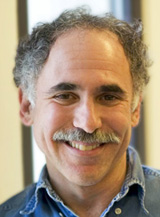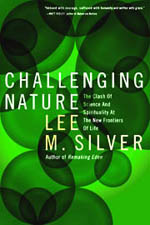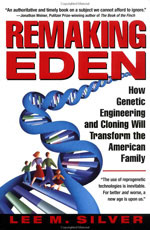Reviewers savaged Remaking Eden, Lee Silver's warning of where genetic engineering may be leading. But Tim Radford finds the Princeton professor is unrepentant, and a number of scientific heavyweights are beginning to think along the same lines
Watch out for Homo proteus, the species that changes its own shape. Last month, Cambridge physicist Stephen Hawking told President Clinton - at a millennium lecture at the White House - that humans were likely to redesign themselves completely over the next 1,000 years.
Also last month, Visions (Oxford pounds 18.99), by the New York physicist Michio Kaku, proposed that humans would get up to all sorts of tricks, including replacing their own organs as they wear out and (if they try hard enough) maybe even engineering wings. Later this year, in a new book called Consilience (published by Little, Brown, no price yet), Edward O Wilson, the great evolutionary theorist of Harvard University, will argue the same thing: that Homo sapiens is about to decommission natural selection, that from now on human evolution will be a matter for science and technology, tempered by ethics and political choice.
Actually, Lee Silver of Princeton University said it all in January in a book called Remaking Eden (Weidenfeld, pounds 20) and got into terrible trouble. The irony is that unlike the others, Silver is a molecular biologist and really does go around altering life as we know it, although not human life. Another irony is that he got it in the neck, in the Guardian, from Lord Winston, one of the giants of reproductive biology. Winston has himself dramatically altered life for many families, simply by making children possible for them. 'We scientists should understand that support for our subject - and hence well-being of our society - depends on proper public understanding of science and accurate appraisal of the risks and benefits it provides,' Winston wrote. 'Dr Silver is simply likely to bring an important subject into disrepute.' One of Silver's offences was to take the tentative and clumsy knowledge of human genes, which now exists, and propose a future Homo supergeneticus. Silver is entirely unrepentant: he doesn't propose a super race because he likes the idea, he says. He is being deliberately outrageous. He proposes it as a warning. 'My fear of genetic engineering is not so much that it will be used to hurt people, because most people want not to hurt their children; most people want to give their children advantages in life. My fear with genetic engineering very simply is one of the things I try to bring out in my book: that it won't be available to everybody. It will cause greater social injustice. That's my real fear,' he says. 'I don't think it is going to be used terribly: I think it is going to be used to prevent disease. The problem is - in the US - that it is going to be controlled by the marketplace. And I am very cynical about the marketplace. That's my fear about genetic engineering: it is so powerful, it is so good, it will only be available to those who have money.' His critics, he says, see the technology as limited. He doesn't. If we can tamper with one gene, why not five, why not 20? It will begin in simple ways at first: the provision of resistance to disease, the elimination of faulty heart genes. Then there will be the additions. One per cent of the people in the world have natural resistance to the HIV virus. Wouldn't it be handy to hand on an immunity to Aids? 'That's the beginning, what other people have. So what's so terrible about you giving something to your child that other people can naturally give to their child?' he asks.
'But then, in the future, the question is: how far can we remove ourselves from human beings? I really think the day will come, whether in 100 years, or 1,000 years, when we really will have a better understanding of how our brain works, and be able to go far beyond. We are all human beings, and basically very similar to each other. But if we stepped out of that, that's dangerous. I look at the US, I look at what the marketplace has done to Americans, and I think it is awful, this huge gap between the haves and the have nots, and genetic engineering just widens that gap.' He doesn't have a problem with altering soya beans, or spraying frost-resistant bacteria on Californian strawberries. He does disconcerting things to mice embryos, like create chimeras - laboratory mice with DNA from four parents instead of two. But genetics is now harnessed to robotics and computing, and the exponential acceleration of the technology astounds him. And he, remember, is one of the practitioners. One criticism of his book was that humans could look only at two or three genes not the whole lot, as cops and doctors do in the movie Gattaca.
'I would have thought that was true, two or three years ago. But all of a sudden, they invent the DNA chip.' The DNA chip gives the potential to look at 100,000 genes, and although scientists don't yet know what most of them do, they will soon. 'It is very simple. It is a little chip, just like a computer chip, but you can put a million different little drops of DNA detectors on it. What these little drops do is detect the presence of a gene. We only have 100,000 genes, or fewer, perhaps 70,000. On this little chip you put down the 10 most common forms of each of our genes, and you put them all down on this little chip and then you take blood, or cells and put them on this chip, and the chip will tell you exactly what form of every gene you have got. This is really, really remarkable. It blows open the whole game.' He is not the only one to be alarmed. Wilson's forthcoming book amounts to a warning. Hawking told the White House gathering: 'I'm not advocating human genetic engineering as a good thing, I'm just saying that it is likely to happen in the next millennium whether we like it or not.' Kaku, too, warned against a new genetic aristocracy. In one way, just the act of writing the book changed things for Silver. When he started writing Remaking Eden, he was an atheist. When he finished, he was not quite so sure.
He also emerged with a picture of the world which echoed that of HG Wells' The Time Machine. The novel foresaw the privileged that enjoyed the light and a species that dwelt in darkness. Only, says Silver, his version wouldn't take a million years to happen.


